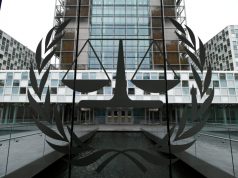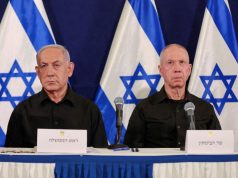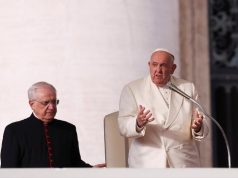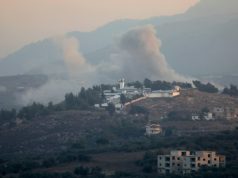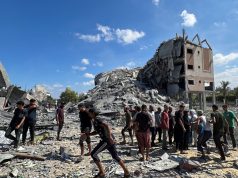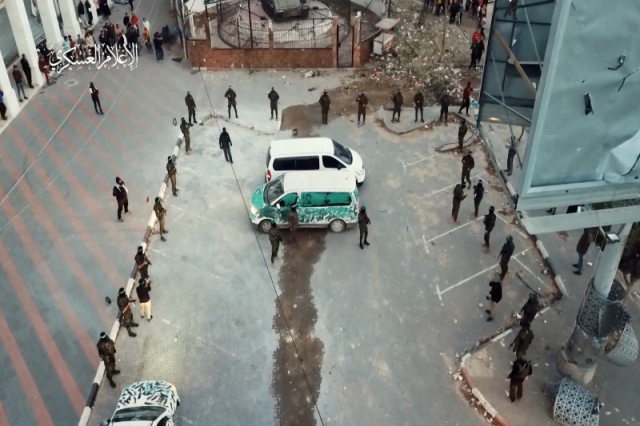
- Red Cross receives latest group of Israeli and foreign hostages
- Israel PM Netanyahu visits his troops in Gaza amid truce
- Netanyahu tells Biden ‘we will return with full force’
JERUSALEM — Hamas freed 17 hostages held in Gaza, including a 4-year-old American girl, while Israel released 39 Palestinian prisoners on Sunday, the third day of their truce.
The International Committee of the Red Cross said it had successfully transferred 17 hostages from Gaza. Hamas said it had handed over 13 Israelis, three Thais and one with Russian citizenship.
The release of the hostages – part of a larger group captured when Hamas fighters rampaged through southern Israel on Oct. 7 – was mirrored by the freeing of 39 Palestinians, all of whom are teenagers, according to the Palestinian news agency WAFA.
Hamas said it wanted to extend the truce if serious efforts were made to increase the number of Palestinian detainees released by Israel.
U.S. President Joe Biden said he hoped the pause in fighting can go on as long as hostages are getting released. He hoped more Americans would be released by Hamas although he did not have firm news.
Biden said the 4-year-old hostage, Abigail Edan, had witnessed her parents being killed by Hamas fighters during their Oct. 7 raid into Israel and had been held since then.
“What she endured is unthinkable,” Biden said at a news conference in the U.S.
Abigail was on her way to the hospital for checks, Israel’s Channel 13 said. Her grandfather, Carmel Edan, told Reuters he “simply could not believe” she had been returned, thanking Biden “for all the help he’s offered us.”
Palestinians gave the freed prisoners a jubilant reception in Ramallah, according to WAFA.
Omar Abdullah Al Hajj, 17, one of the detainees released Sunday, said he’d been kept in the dark about what was happening in the outside world.
“I can’t believe I’m free now but my joy is incomplete because we still have our brothers who remain in prison, and then there is all the news about Gaza that I am having to learn about now,” he told Reuters.
The four-day truce is the first halt in fighting in the seven weeks since Hamas killed 1,200 people and took about 240 hostages back into Gaza.
In response to that attack, Israel has vowed to destroy the Hamas militants who run Gaza, bombarding the enclave and mounting a ground offensive in the north. Some 14,800 Palestinians have been killed, Gaza health authorities say, and hundreds of thousands displaced.
Israeli Prime Minister Benjamin Netanyahu on Sunday met security forces inside the Gaza Strip. He also said he spoke to Biden about the hostage release, adding that he would welcome extending a temporary truce if it meant that on every additional day 10 captives would be freed.
However Netanyahu said he also told Biden that, at the end of the truce, “we will return with full force to achieve our goals: The elimination of Hamas, ensuring that Gaza does not return to what it was; and of course the release of all our hostages.”
Fragile deal
Sunday’s hostage release follows the liberation of 13 Israelis on Saturday – six of them women and seven of them teenagers or children. The youngest was 3-year-old Yahel Shoham, freed with her mother and brother, although her father remains a hostage.
Israel freed 39 Palestinians the same day – six women and 33 teenagers – from two prisons, WAFA said.
A Palestinian source has said up to 100 hostages could ultimately go free.
Qatar, Egypt and the United States are pressing for the truce to be extended beyond Monday but it is not clear whether that will happen.
Clashes and recriminations have threatened to torpedo the existing deal.
The killing of a Palestinian farmer in the central Gaza Strip had earlier added to those concerns. The farmer was killed when targeted by Israeli forces east of Gaza’s long-established Maghazi refugee camp, the Palestinian Red Crescent said.
The armed wing of Hamas also said on Sunday that four of its military commanders in the Gaza Strip had been killed, including the commander of the North Gaza brigade, Ahmad Al Ghandour. It did not say when they had been killed.
Violence has also flared in the West Bank, where Israeli forces killed seven Palestinians, including two minors and at least one gunman, late on Saturday and early Sunday, medics and local sources said.
Even before the Oct. 7 attacks from Gaza, the West Bank had been in a state of unrest, with a rise in Israeli army raids, Palestinian attacks, and violence by Israeli settlers in the past 18 months. More than 200 Palestinians have been killed in the West Bank since Oct. 7, some in Israeli air strikes.
Immense relief
The deal survived an earlier threat when Hamas’ armed wing said on Saturday it was delaying hostage releases until Israel met all truce conditions, including committing to let aid trucks into northern Gaza.
Saving the truce took a day of diplomacy mediated by Qatar and Egypt, which President Biden also joined.
Hamas’ al-Qassam Brigades also said Israel had failed to respect terms for the release of Palestinian prisoners that factored in their time in detention.
COGAT, the Israeli agency for civilian coordination with the Palestinians, accused Hamas itself of delaying trucks trying to deliver humanitarian aid to northern Gaza at a checkpoint.
“To Hamas, residents of Gaza are their last priority,” it said on Sunday.
Qatari diplomats are now on site in Gaza to supervise the entry and delivery of their country’s aid, Qatar’s Foreign Ministry said.
A U.N. official who took part in a humanitarian convoy to northern Gaza said on Sunday aid groups were on track to deliver the biggest shipment in over a month, describing thin, gaunt residents slaking their thirst as soon as water arrived.
“People are so desperate and you can see in adults’ eyes they haven’t eaten,” the U.N. children’s agency’s James Elder told Reuters by video link from southern Gaza after returning from Gaza City.
“There’s just this immense relief. Literally people as they get water start drinking the water immediately,” he said. “They’re thirsty. They’ve been thirsty for days.”
Even as the aid deliveries flowed north, Elder said he saw hundreds of Gazans heading in the other direction, fearing the renewal of Israeli bombardments if the four-day truce is not prolonged.
“People are so terrified that this pause won’t be continued,” he said.
– Reporting by Emily Rose, Emma Farge, Bassam Masoud, James Mackenzie, Aidan Lewis, Ari Rabinovitch, Adam Makary, Nidal al-Mugrabi and Moaz Abd-Alaziz; Additional reporting by Ali Sawafta in Ramallah, Nafisa Eltahir in Cairo, Andy Sullivan in Washington, Moira Warburton; Writing by Raphael Satter, Keith Weir and Giles Elgood; Editing by Angus MacSwan, Nick Macfie, Louise Heavens, David Gregorio and Diane Craft





